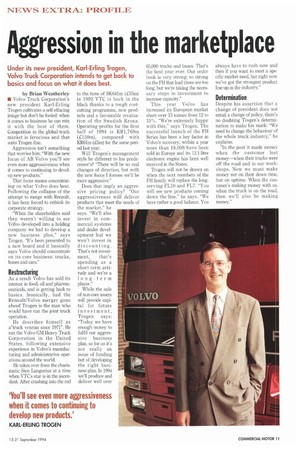Aggression in the marketplace
Page 13

If you've noticed an error in this article please click here to report it so we can fix it.
by Brian Weatherley • Volvo Truck Corporation's new president Karl-Erling Trogen cultivates a self-effacing image but don't be fooled: when it conies to business he can mix it with the best of them. Competition in the global truck market is ferocious and that suits Trogen fine.
Aggression isn't something that worries him: "With the new focus of AB Volvo you'll see even more aggressiveness when it comes to continuing to develop new products."
That focus means concentrating on what Volvo does best. Following the collapse of the attempt to merge with Renault, it has been forced to rethink its corporate strategy.
"When the shareholders said they weren't willing to see Volvo developed into a holding company we had to develop a new business plan," says Trogen. "It's been presented to a new board and it basically says Volvo should concentrate on its core business: trucks, buses and cars."
Restructuring
As a result Volvo has sold its interest in food, oil and pharmaceuticals, and is getting back to basics. Ironically, had the Renault/Volvo merger gone ahead Trogen is the man who would have run the joint truck operation.
He describes himself as a''truck veteran since 1971''. He ran the Volvo GM Heavy Truck Corporation in the United States, following extensive experience in Volvo's manufacturing and administrative operations around the world.
He takes over from the charismatic Sten Langenius at a time when VTC's star is in the ascendant. After crashing into the red to the tune of SK641m (A:55m) in 1992 VTC is back in the black thanks to a tough costcutting programme, new products and a favourable revaluation of the Swedish Krona. Operating profits for the first half of 1994 is KR1,769m (£150m), compared with KR61m (£5m) for the same period last year.
Will Trogen's management style be different to his predecessor's? "There will be no real changes of direction, but with the new focus I foresee we'll be more aggressive."
Does that imply an aggressive pricing policy? "Our aggressiveness will deliver products that meet the needs of the market," he says. "We'll also invest in commercial systems and dealer development but we won't invest in discounting. That's not invest ment, that's spending as a short-term attitude and we're a long-term player."
While the sale of non-core assets will provide capital for future in Trogen says: "Today we have enough money to fulfil our aggressive business plan, so for us it's not really an issue of funding but of developing the right business plan. In 1994 we'll produce and deliver well over 65,000 trucks and buses. That's the best year ever. Our order book is very strong; so strong on the FH that lead times are too long, but we're taking the necessary steps in investment to increase capacity."
This year Volvo has increased its European market share over 15 tonnes from 12 to 15%. "We're extremely happy with this," says Trogen. The successful launch of the FH Series has been a key factor in Volvo's recovery; within a year more than 18,000 have been sold in Europe and its 12.1-litre electronic engine has been well received in the States.
Trogen will not be drawn on when the next members of the FH family will replace the longserving FL10 and FI.7: "You will see new products coming down the line," he says. We have rather a good balance. You always have to rush now and then if you want to meet a specific market need, but right now we've got the strongest product line-up in the industry."
Determination
Despite his assertion that a change of president does not entail a change of policy, there's no doubting Trogen's determination to make his mark: We need to change the behaviour of the whole truck industry," he explains.
"In the past it made money when the customer lost money—when their trucks were off the road and in our workshops. Now we must make money not on their down time, but on uptime. When the customer's making money with us, when the truck is on the road, then we'll also be making money."
































































































